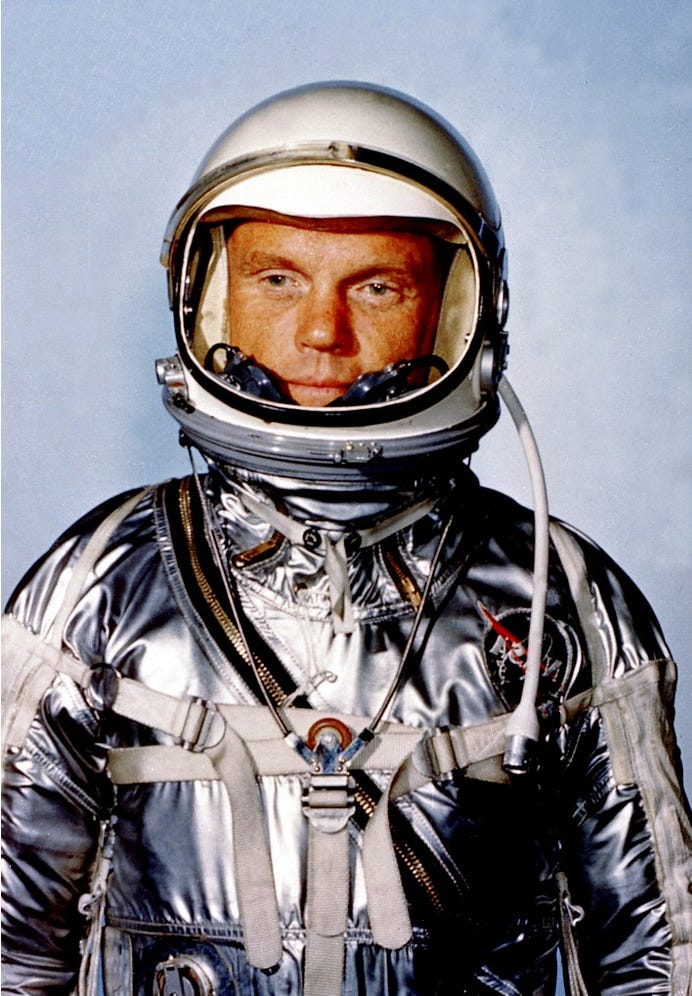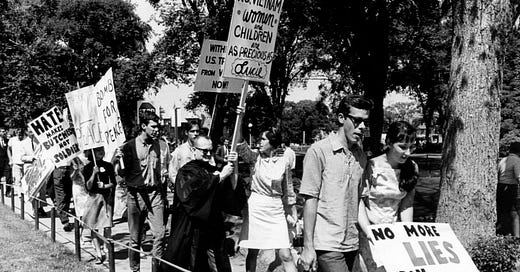Hi all,
Thank you for joining me for this week’s song, Eve of Destruction, by P.F. Sloan, 1965, sung by Barry McGuire.
If you’d like to hear the song before you read the background, I’ve included a YouTube video below the article.
Comments and questions are welcome. Please be respectful of others’ opinions if they should differ from yours.
For Japanese students, vocabulary words in bold are provided in Japanese below.
This song has been explained countless times. If you are able to sing the song from memory, feel free to close this window. There are those, however, who are of a younger age and who might never have heard this song or understand what the lyrics mean. That’s who this post is for. —>That said, there are some notes at the end of the main article that you might not know.
The Song
(663 words)
The 1960s in the United States was a turbulent period. The Vietnam War was going on, there was poverty, especially in African-American communities, women were demanding equal rights, the space race with the Soviet Union had begun, students in high schools and universities were protesting against the war (many of them were being drafted), and leaders in the Civil Rights movement were being killed.
This song, Eve of Destruction by Barry McGuire, outlines some of those problems.
The Eastern world it is explodin’ refers to the war in Vietnam.
You’re old enough to kill but not for votin.’ In the 1960s, the draft forced many young men who were aged as young as 18 and 19 to go into the military. The voting age was 20. This meant that they had no voice in their government but had to follow orders of people they did not elect. However, even if they disagreed with the war (you don’t believe in war), they could be drafted. Young men who disagreed with the war but agreed to be drafted were often criticized: what’s that gun you’re toting’?
And you tell me over and over and over again, my friend, how you don’t believe we’re on the eve of destruction
The singer asks a philosophical question: with all the terrible things that are happening in this country, you really don’t think we are about to destroy ourselves?
By this time, nuclear weapons had been used in Japan, and the Soviet Union had developed its own atomic weapon. The button refers to the button that would launch another atomic bomb.
Handful of Senators don’t pass legislation, and marches alone can’t bring integration. Millions of Americans had marched in support of civil rights during the 1950s and 1960s, but government officials were slow to respond.*
When human respect is disintegratin’, this whole crazy world is just too frustratin’. The songwriter simply cannot understand how human beings can treat each other this way, either in wars abroad or discrimination at home.
Look at all the hate there is in Red China, then take a look around at Selma, Alabama… In 1962, there was a conflict between India and China as well as problems resulting from the Chinese Revolution. In Selma, Alabama, civil rights marchers had been violently attacked by police when they tried to cross a bridge to get to the state capital of Montgomery.

You may leave here for four days in space but when you return it’s the same old place… In 1962, John Glenn became the third American to go into space. His ship circled the earth for four days and then came back down to earth. However, none of the social problems had been solved.
The poundin’ of the drums… Here, Sloan may have been referring to the “drums of war”, a sound from long ago when armies had a section of drums to march the soldiers forward. In English, it can also mean that people (media, government, etc.) are “beating the drums of war” in that they want to get the population to support the war. The pride and disgrace may mean that the soldiers and their families were proud of the soldiers’ service for their country, but the country’s leaders should be ashamed of carrying on a senseless and unjust war - at least for those who were fighting it but not seeing any benefit for their efforts back in the U.S.
You can bury your dead, soldiers on both sides of the war, from all the countries that participated in it, but don’t leave a trace… I don’t know. Any suggestions?

Hate your next-door-neighbour, but don't forget to say grace refers to the racial divide in the U.S. in the 1960s. Many whites (but not all) did not want black people to move into (what they thought were) their neighborhoods. At the same time, these people would say a prayer (grace) before eating a meal, a pious action that showed reverence for God.
Japanese version
(216 words)
Kiyoshiro Imawano, a popular Japanese performer from the 1970s until his death in 2009, did a remake of this song. Some of the lyrics are slightly different. The third verse says,
They say I’m crazy, but they can’t change the truth
Politicians always try to cover it up, laws can’t hide the truth
Just demonstrate, and peace will come, I don’t have any sweet dreams
But you tell me…
The fourth verse has vague lyrics, probably so that listeners would be able to follow, rather than making direct reference to tings that were happening in the U.S. at the time:
This crazy world is noisy, I’ve got to get away from all this
I'm going up to space for a week, but I’ll come back to my old hometown
The marching trumpets echo in the dark
Submarines and jets surround the country
In 1960, Japan signed the Security Treaty with the United States. That treaty stated that the U.S. could only bring nuclear weapons into the country with prior consultation. It did not address whether the U.S. could have nuclear-armed ships stay in ports in Japan. In the early 1960s, the U.S. did, indeed, bring such ships into Japanese ports. The Japanese people were opposed to this, and it caused a political problem for the government.
VOCABULARY
turbulent 激動
poverty貧困
draft 徴兵
explode 爆発
tote 持つ
philosophical 哲学的
disintegrate 崩壊
frustrating イライラさせる
discrimination 差別
pounding of the drums 太鼓の鼓動
disgrace 不名誉
be ashamed 恥を知る
senseless 無意味な
unjust 不当
pious 敬虔
reverence 尊敬
surround 取り巻く
NOTES
*In June of 1964, President Johnson signed The Civil Rights Act which made it illegal to discriminate on the basis of race, color, religion, national origin, or sex. Later, in August, 1965, President Johnson signed the Voting Rights Act which made it illegal to deny any U.S. citizen the right to vote.
SOURCES
Nakashima, Takuma. 2022. Alliance Politics in Context: Issue of Nuclear-Powered Submarine Visits to Japan: Advances in Nuclear Weapons Technology and Japan’s Dilemma of Alliance Management. International Relations. Volume 2022, Issue 206 Pages 206_101-206_116. https://www.jstage.jst.go.jp/article/kokusaiseiji/2022/206/2022_206_101/_article/-char/en [一般財団法人 日本国際政治学会. (2022, March 31). 原子力潜水艦の日本寄港問題 ――核兵器技術の発展と同盟管理のジレンマ――. 国際政治. ]
The Japanese lyrics can be found at: https://www.uta-net.com/song/200134/ and the video (忌野清志郎 ギター1本でTV生ライブ ) here:




